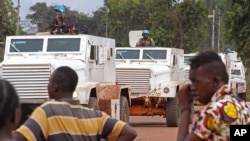Workers are busy fixing roads and putting fresh coats of paint on the cathedral and central mosque as the Central African Republic capital readies itself for Pope Francis’ arrival Sunday, the last stop of his three-country Africa tour.
But the country’s problems are bigger than potholed thoroughfares and shabby buildings.
Nearly two years of sectarian conflict has killed thousands of people and forced hundreds of thousands more to flee their homes.
Muslim and Christian militiamen sporadically clash in the capital, and armed groups roam the countryside despite the presence of about 12,000 U.N. peacekeepers and French troops. Stalled disarmament has undermined efforts to stabilize the country. Much-delayed elections are now scheduled for December 27.
Pope dismisses risks
Vatican officials have hinted that the pope could still change his itinerary, given the security concerns. But the pope brushed off the risks Wednesday as he flew to Nairobi, joking with reporters that he was "more worried about the mosquitoes."
Bangui's faithful have high hopes for the pope's visit, which follows stops in Kenya and Uganda.
“It’s a great relief for the Central African people. We’ve been expecting this occasion for a long time,” said rural development worker Marie-Albertine Ndoitoua as she sat outside the city’s cathedral.
Others were more cautious.
“If everyone is of the same heart, the situation can change,” said Constantin Nguinda, a student praying outside the cathedral. “But it's not as simple as the pope coming and changing the situation.”
In a video message released before his arrival, Francis promised the people of the C.A.R. “the comfort of consolation and hope,” according to Vatican Radio. Both have been sorely lacking over the past few years.
Alleged looting, abuses
The country has long suffered from poverty and misrule. The latest crisis started after the mostly Muslim Seleka rebel coalition overthrew President Francois Bozize in March 2013.
Their brief reign was punctuated by allegations of looting and rights abuses, such as throwing people into crocodile-filled rivers. Militia members rose up against them in December 2013, sparking fierce fighting that devolved into intercommunal slaughter. French and regional troops deployed to the C.A.R. The Seleka government was forced out by January, but the trouble was just beginning.
Groups known as the anti-balaka militia targeted Muslim civilians as revenge for Seleka abuses. The tit-for-tat killings spiraled from there. Anti-balaka fighters destroyed Muslim homes, businesses and mosques. Mobs lynched Muslims in the streets. Much of the country's Muslim minority fled to neighboring countries.
Only the PK5 neighborhood remains safe for Muslims in Bangui, but residents live under siege. Anti-balaka fighters surround the neighborhood, stationed at the entrances and exits with guns and grenades. Inside PK5 are former Seleka fighters.
Hoping to change hearts
Francis is expected to visit the central mosque in PK5, still surrounded by the tents of displaced residents.
"We are optimistic that this visit can bring a great change to the heart of Central Africans, which will lead to a return of the peace and a return to Muslims and Christians living together,” said Oumar Kobine Layama, president of C.A.R.’s Islamic Council and a prominent advocate of reconciliation.
Anti-balaka leaders say they are open to reconciliation.
“If the pope comes, I know that peace will return to our country,” said Alfred Rombhot, a powerful anti-balaka commander in Bangui. He called the Muslims in PK5 his “brothers” and said the only problem he had was with the foreign mercenaries he claimed were hiding there.
But the city remains tense.
Fighting flared again at the end of September after a Muslim taxi driver was slain. Dozens were killed and thousands fled their homes. Violence in the countryside has killed at least 22 people this month.




